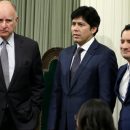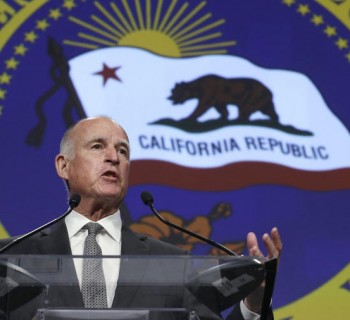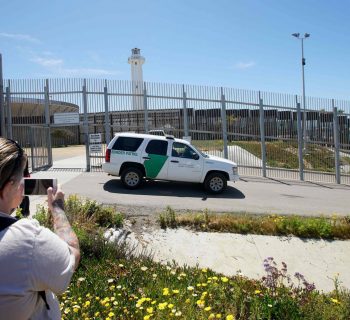By Cesar Vargas, contributor, The Hill ~ September 28, 2016
[Image source: Reuters, Larry Downing]
As the election cycle enters the final sprint, all of the presidential nominees — Democrat Hillary Clinton, Republican Donald Trump, Jill Stein of the Green Party and Gary Johnson of the Libertarians — are elevating their signature policies.
On immigration, the next president has an opportunity to do something that has eluded the past four presidencies: pass immigration reform. To do that, however, he or she must not fall into the traps of the past. The following are three moves that will secure legislation reaching the presidential desk.
1. Don't let Sen. Chuck Schumer lead.
The incoming Senate majority leader is a political tactician. As head of the Democratic Senatorial Campaign Committee, the New York senator was key in engineering the party's takeover of the Senate in 2006 and gains of the Senate in the 2006 and 2008 election cycles. On the craft of legislating, however, Schumer stumbles.
The senator has a tendency to negotiate haphazardly, giving away key policies for the sake of insignificant votes. As a lead negotiator in the 2014 immigration reform debate, he gave in to Republican demands on the "border surge," nearly doubling the current border patrol force to 40,000 agents from 21,000, as well as for the completion of 700 miles of fence on the nation's southern border.
It was hoped that the deal would secure the support of at least 70 senators, more than enough to overcome a filibuster and send a strong message to then-Speaker John Boehner (R-Ohio) to pressure his Republican conference to approve the bill. The legislation ultimately failed in the House, but not before being inflating by billions in handouts and establishing an unworkable border enforcement standard that will haunt Congress come 2017.
2. Leverage executive action.
On day one, the next president should have at his or her disposal a complete binder of key actions to modernize the nation's outdated immigration system. Republicans like Rep. Steve King (R-Iowa) and Sen. Jeff Sessions (R-Ala.) will oppose any and every effort to reform immigration, regardless of the type of reform. Contrary to political scare stories, however, preparing for key executive initiatives will not poison the well of Congress.
Instead, such moves will demonstrate that the next president is serious in embracing his or her power as chief executive of the federal agencies, and will not back down in the face of stalemate and threats.
For example, the next president could immediately direct the Department of Homeland Security to end private prison contracts that unnecessarily cost billions to taxpayers and update Department of Defense policy to allow Dreamers to serve in the United States Armed Forces. This would follow similar, successful efforts by the Department of Justice to end its private prison contracts and the existing the Military Accessions Vital to the National Interest (MAVNI) program that allows certain immigrants to serve in the Army.
3. Understand that good policy is good politics.
The Democratic Party's official policy platform will be a useful guide for the next president to follow. On immigration, the platform has bold initiatives that would have never been seen in the past.
While far from perfect, Democrats officially accept that there will be no arbitrary deportation programs that unnecessarily rip apart families and undermine police-community relations; that there needs to be an affirmative process for workers to report labor violations and to request deferred action; a way ensure that all Americans — regardless of immigration status — have access to quality healthcare; and they oppose the deportation of veterans.
Regardless of whether there is a Democrat, Republican, Libertarian or Green president, the Democrats' platform contains policies crafted from the feedback of real people. With politics certain to play into the next immigration reform battle, there is no larger advantage in a turbulent election cycle than leading with good policies.
Cesar Vargas is director of the DREAM Action Coalition and a national advocate for immigration reform.







